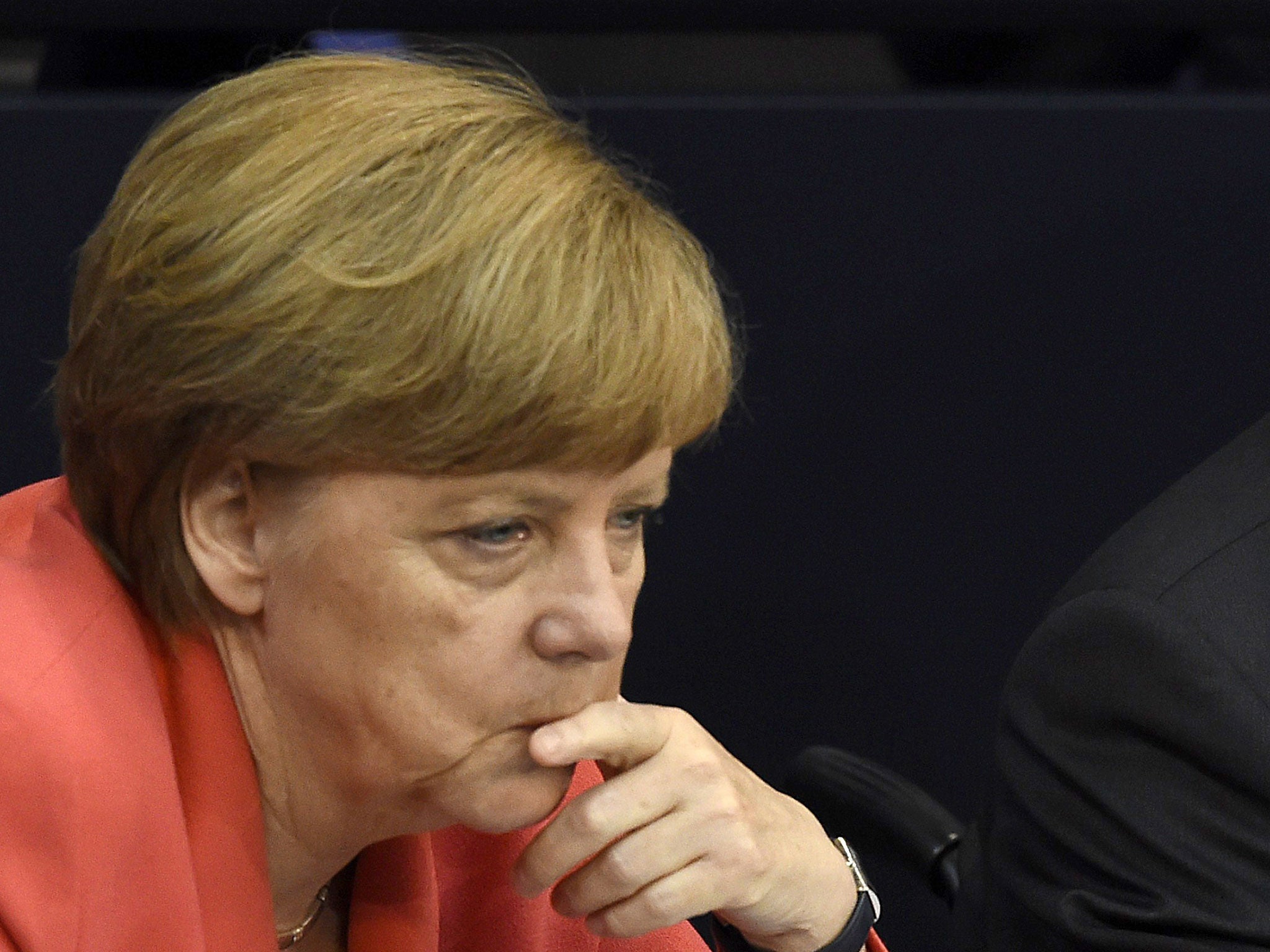Greece news: 60 of Merkel’s MPs rebel but she wins support for bailout saying alternative would be 'chaos and violence'
German Chancellor was obliged to rely on votes of Social Democrat coalition government

German Chancellor Angela Merkel has been given begrudging parliamentary backing to start talks on the eurozone’s controversial €86 billion Greek bailout package, after facing an unprecedented rebellion from a record 60 MPs in her own party, who voted against the plan, and five others who abstained.
After three hours of often heated debate, the German Bundestag voted by 439 to 119 in favour of entering negotiations with Greece on the three-year bailout package.
Before the vote, Ms Merkel warned that if the EU voted against the bailout plan there would be “chaos and violence” in Greek cities. “Even if our differences are huge, we will do what we can to ensure that Greece can remain part of the eurozone,” she added.
However with 40 abstentions and 119 MPs voting against, parliamentary opposition to the bailout stood at record levels. Particularly worrying for Ms Merkel was the scale of protest, accounting for almost one-fifth of her own conservative Christian Democratic Party (CDU). Leading CDU member Wolfgang Bosbach argued that more taxpayers money for Greece is money down the drain.
Ms Merkel was obliged to rely on the votes of her Social Democrat coalition government. The vote only gave approval for Germany to begin talks with Athens over the bailout plan, and the Bundestag will have to vote a second time to confirm the negotiated deal.
An opinion poll published by Germany’s state funded ARD television channel yesterday suggested that the public is also growing disenchanted with Ms Merkel’s backing for Greece. The poll showed 49 per cent opposed negotiations on a further bailout package, while only 46 per cent approved.
Before yesterday’s vote, sharp divisions had already opened up within Ms Merkel’s cabinet, with Wolfgang Schaüble, her Finance Minister, declaring that a temporary five-year Grexit might be the solution to Greece’s problems. Conservative MPs treated Mr Schaüble to lengthy applause during the session. The Finance Minister criticised the Athens government for failing to implement necessary reforms and insisted that, in relative terms, Greece still had a bigger bureaucracy and higher pensions than Germany. Reluctantly giving his backing to the bailout negotiations he added: “This is a final attempt to fulfil this extremely difficult task.” He added it: “went against experience.”
The vote came as other eurozone countries confirmed their backing, including Austria, while France’s national assembly overwhelmingly backed the deal on Wednesday. The Lithuanian government approved the negotiations on Thursday, and the Latvian government followed yesterday. Estonia, Slovenia and Spain are expected to confirm shortly.
The parliament most likely to vote against is the Netherlands, where Prime Minister Mark Rutte’s ruling coalition has a one-seat majority.
In pictures: Riots on the streets of Athens as Greek parliament votes on a bailout deal
Show all 20There was a surprise U-turn in Finland, where the government – dependant on the Eurosceptic Finns Party – had signalled last weekend it would not support a new bailout. But the Parliament’s 25-member Grand Committee gave its approval after Finns Party leader Timo Soini eventually agreed, even though he likened it to choosing between “plague and cholera”.
The confirmations came as the eurozone members yesterday finalised a €7.16 billion bridging loan to Greece to support the struggling economy until the bailout comes into effect. The three-month loan, under the European Financial Stabilisation Mechanism (EFSM) will allow Greece to clear its arrears with the International Monetary Fund (IMF) and to repay debts the European Central Bank (ECB).
The bailout itself could be negotiated “within a few weeks” European Commission Vice President Valdis Dombrovskis said yesterday. Mr Dombrovskis also said debt restructuring would be part of the talks. This would echo suggestions by IMF head Christine Lagarde, who has urged negotiators to agree debt relief.
Meanwhile, ECB President Mario Draghi has said that emergency funding to Greek banks was being raised by €900m over one week, meaning Greece banks can open their doors on Monday for the first time in three weeks. The €60 daily cash restriction will remain in place, but banks will be able to offer other services, such as money transfer from one account to another.
Greek Prime Minister Alexis Tsipras was expected to reshuffle his cabinet yesterday, pushing aside Syriza members who voted against last week’s deal. However, with large brush and forest fires near Athens yesterday, Mr Tsipras spent much of the day overseeing the response by emergency services.
Subscribe to Independent Premium to bookmark this article
Want to bookmark your favourite articles and stories to read or reference later? Start your Independent Premium subscription today.

Join our commenting forum
Join thought-provoking conversations, follow other Independent readers and see their replies